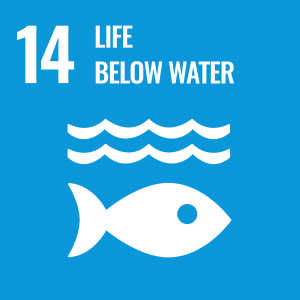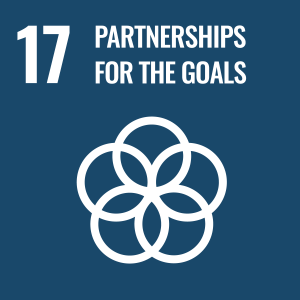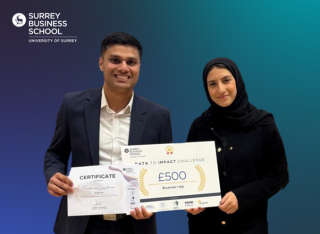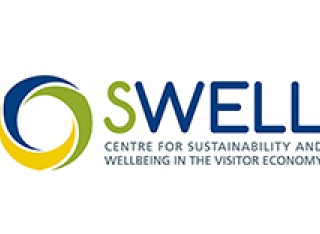
Dr Anke Winchenbach
Academic and research departments
Surrey Hospitality and Tourism Management, Centre for Sustainability and Wellbeing in the Visitor Economy, Future of Work, Institute for Sustainability.About
Biography
My research and consultancy are primarily focused on social dimensions of sustainability in tourism and related industries, intersecting with fisheries and marine social sciences, sociology, and social psychology. I am researching topics such as dignity and decent work, labour and human rights, social change, identity, livelihood transitions, coastal community resilience, as well as how we assess social value across individual, organisational and governance levels. I’m a Fellow of Surrey’s Future of Work Research Centre and the Institute for Sustainability, as well as the Centre for Sustainability and Wellbeing in the Visitor Economy. Currently I serve as the elected co-president of the International Tourism Research Committee (RC50) of ISA and hold several advisory roles with industry organisations.
Prior to joining academia, I worked as senior consultant at NEF Consulting, the consultancy arm of the New Economics Foundation, UK’s leading think tank on transforming the economy that benefits people within planetary boundaries. My role focused on designing, delivering, and managing projects, as well as open and tailored training and workshops in the areas of evaluation & impact assessment, training & capacity building, and strategy & culture change for public, private, and third sector organisations.
I also managed the innovative 'Total Impact Measurement and Management' (TIMM') project for The Travel Foundation in partnership with PwC, which measured TUI Group's holistic impact in Cyprus. I hold a Masters degree with distinction in Tourism, Environment and Development from King's College London, and have worked in travel and tourism management in my earlier career.
University roles and responsibilities
- Member of the University's Ethics Committee
- Module Leadership
- Sustainability and Wellbeing research group
- Menopause Champion
- Personal tutoring
- Programme Leader BSc International Tourism Management & International Tourism Management with Transport (AY 2021-22)
- Academic Integrity Officer (2018-2021)
Affiliations and memberships
People in our network are researching on a wide range of themes, such as the quality of work and employment, migration, geopolitics, gender, accessibility, social justice, and sustainability to name just a few. We recently launched T3S Tourism Sociology Seminar Series, an online seminar series where we bring our research to wider audiences, invite guest speakers, and to make our work more visible and encourage debate and collaboration.
For more information please visit https://www.isa-sociology.org/en/research-networks/research-committees/rc50-international-tourism/ and connect with us on social media: https://www.facebook.com/groups/6567443666619519/
https://www.linkedin.com/groups/9371249/
Business, industry and community links
News
In the media
ResearchResearch interests
Sustainable Tourism, Social Psychology & Marine Social Sciences | Decent Work, Wellbeing, Dignity, Identity, Gender & Social Justice | Rural, Coastal & Indigenous Communities | Livelihood transitions and social change
Research projects
BA/ Leverhulme Small Grant (PI) (£9,918) ‘How can tourism maximise the positive impact and dignity for Indigenous people? A capabilities approach’. Applying a qualitative microethnographic approach, and following Nussbaum’s Capabilities Approach, this project will identify the abilities, resources, and external conditions that enable Indigenous groups in Mexico to develop and manage tourism enterprises that will support economic and socio-cultural development and lift individual and collective dignity approach. Collaboration with Universidad de Monterrey/ Mexico. (2023-24)
Women in Leadership workshopIAS Women in Leadership workshop (Co-convenor) held in May 23 (IAS, £2,863). The workshop brought academic and industry stakeholders together to talk about women in leadership, develop new networks and strengthen collaboration. (2023)
Collaborative Online International Learning (COIL)Collaborative Online International Learning (COIL) (PI) project (£910 funded by the University of Surrey) between the University of Surrey/ UK and Universidad de Monterrey/ Mexico March to May 2022. The key focus of this project was the virtual mobility of tourism students and involved students learning together through the medium of technology. The key objectives of this project were as follows:
- Building confidence and capacity by supporting future leaders in developing and deepening several transferrable skills, knowledge, and competencies including cross-cultural communication and understanding, knowledge-sharing, innovating and developing solutions to wider global and industry problems, and digital capabilities (both, through asynchronous collaboration as well as video assessment).
- Encourage and enable digital student and staff collaboration, which responds to ongoing COVID travel restrictions, but also aligns with the wider sustainable tourism agenda to reduce global carbon emissions.
- Contribute to the international research and learning community on sustainable tourism through dissemination of student videos, as well as journal article sharing project outcomes and learnings
Project outputs:
New online teaching & learning resources about recommendations for addressing current challenges and honouring and promoting the dignity of Indigenous groups through tourism, available under this link: https://www.pechakucha.com/events/dignity-tourism-and-indigenous-groups-powered-by-pechakucha
Project and winning team featured in the two most important local Mexican newspapers (El Norte and Milenio) and Universidad de Monterrey and University of Surrey media and social networks
The project inspired the project facilitators to collaboratively apply for a BA/ Leverhulme Small Grant to conduct further research (approved September 2022).
Spring 2023
Developing national and international networks and exploring levers for change at the intersection between rural coastal livelihoods and tourism diversificationESRC Impact Acceleration Fund (PI) (£10,100) Active network/knowledge exchange hub on rural/ coastal diversification. This project involved expansion of networks and capabilities for delivering strong collaborative research and co-design activities and policies supporting rural and coastal tourism diversification. It provided new opportunities for exploring the UK policy environment and forming international collaborations, engaging with senior academics in Wakayama/ Japan and DEFRA in the UK. The project developed significant collaborations and sparked new ideas in differing cultural and policy contexts. Longer term impact will be to ensure that one of the most pressing challenges facing society is tackled, specifically supporting the wellbeing and resilience of marginalised rural and coastal communities within and outside the UK.
Diversifying with dignity: Coastal Tourism Employment in the UKHer PhD Diversifying with dignity: Coastal Tourism Employment in the UK will bring innovative theoretical insights to understanding employment diversification in times of economic pressures and declining natural resources. As economies diversify, there are persistent challenges for new forms of employment to offer genuine alternatives to traditional forms of employment. Utilising dignity as guiding concept, the project will explore how people experience and understand their lives in relation to their work. The research will contribute to the theoretical development of the concept of dignity and will add to the debate around the value of service sector employment. The final output will contribute to enabling policy makers and businesses to manage meaningful livelihood diversifications, which protect and promote dignity, whilst positively affecting efficiency and profitability of destinations and businesses; and ultimately supporting the sustainable regeneration of marginalised areas. The proposed research will use tourism employment in the context of fishing towns in Cornwall as case study, which is expected to develop implications for the service economy and wider employment studies.
Supervisors
Professor Graham Miller
Coping with change: Livelihood transitions strategies and practices through tourism in marginalised communitiesResearchers: Dr Irma Booyens (PI – Human Science Research Council S.A.), Dr Albert Kimbu (CI – University of Surrey) & Mrs Anke Winchenbach (Collaborator – University of Surrey). This research seeks to explore livelihood transitions from primary economic activities into tourism employment in marginalised communities. The aim is to investigate the developmental role of tourism within a sustainable development framework. Tourism is often offered as a panacea for development in areas where traditional activities such as agriculture and fishing have declined. This proposed research seeks to determine whether and how affected communities in the UK and South Africa cope with these changes, and what their coping strategies are, the role tourism has played in diversifying local livelihoods, if and how obstacles to participating in tourism are overcome, how capabilities are built, and its influence on gender and community relations. This research addresses an under investigated area concerning sustainable human resources and decent employment in tourism. It aligns with the Sustainable Development Goals 1 (poverty), 5 (gender) and 8 (decent work). It also is concerned with resilience in tourism. Source of Funding: British Academy Newton Mobility Grant (Total value: £9K) Duration: March 2018 - March 2019.
Research interests
Sustainable Tourism, Social Psychology & Marine Social Sciences | Decent Work, Wellbeing, Dignity, Identity, Gender & Social Justice | Rural, Coastal & Indigenous Communities | Livelihood transitions and social change
Research projects
BA/ Leverhulme Small Grant (PI) (£9,918) ‘How can tourism maximise the positive impact and dignity for Indigenous people? A capabilities approach’. Applying a qualitative microethnographic approach, and following Nussbaum’s Capabilities Approach, this project will identify the abilities, resources, and external conditions that enable Indigenous groups in Mexico to develop and manage tourism enterprises that will support economic and socio-cultural development and lift individual and collective dignity approach. Collaboration with Universidad de Monterrey/ Mexico. (2023-24)
IAS Women in Leadership workshop (Co-convenor) held in May 23 (IAS, £2,863). The workshop brought academic and industry stakeholders together to talk about women in leadership, develop new networks and strengthen collaboration. (2023)
Collaborative Online International Learning (COIL) (PI) project (£910 funded by the University of Surrey) between the University of Surrey/ UK and Universidad de Monterrey/ Mexico March to May 2022. The key focus of this project was the virtual mobility of tourism students and involved students learning together through the medium of technology. The key objectives of this project were as follows:
- Building confidence and capacity by supporting future leaders in developing and deepening several transferrable skills, knowledge, and competencies including cross-cultural communication and understanding, knowledge-sharing, innovating and developing solutions to wider global and industry problems, and digital capabilities (both, through asynchronous collaboration as well as video assessment).
- Encourage and enable digital student and staff collaboration, which responds to ongoing COVID travel restrictions, but also aligns with the wider sustainable tourism agenda to reduce global carbon emissions.
- Contribute to the international research and learning community on sustainable tourism through dissemination of student videos, as well as journal article sharing project outcomes and learnings
Project outputs:
New online teaching & learning resources about recommendations for addressing current challenges and honouring and promoting the dignity of Indigenous groups through tourism, available under this link: https://www.pechakucha.com/events/dignity-tourism-and-indigenous-groups-powered-by-pechakucha
Project and winning team featured in the two most important local Mexican newspapers (El Norte and Milenio) and Universidad de Monterrey and University of Surrey media and social networks
The project inspired the project facilitators to collaboratively apply for a BA/ Leverhulme Small Grant to conduct further research (approved September 2022).
Spring 2023
ESRC Impact Acceleration Fund (PI) (£10,100) Active network/knowledge exchange hub on rural/ coastal diversification. This project involved expansion of networks and capabilities for delivering strong collaborative research and co-design activities and policies supporting rural and coastal tourism diversification. It provided new opportunities for exploring the UK policy environment and forming international collaborations, engaging with senior academics in Wakayama/ Japan and DEFRA in the UK. The project developed significant collaborations and sparked new ideas in differing cultural and policy contexts. Longer term impact will be to ensure that one of the most pressing challenges facing society is tackled, specifically supporting the wellbeing and resilience of marginalised rural and coastal communities within and outside the UK.
Her PhD Diversifying with dignity: Coastal Tourism Employment in the UK will bring innovative theoretical insights to understanding employment diversification in times of economic pressures and declining natural resources. As economies diversify, there are persistent challenges for new forms of employment to offer genuine alternatives to traditional forms of employment. Utilising dignity as guiding concept, the project will explore how people experience and understand their lives in relation to their work. The research will contribute to the theoretical development of the concept of dignity and will add to the debate around the value of service sector employment. The final output will contribute to enabling policy makers and businesses to manage meaningful livelihood diversifications, which protect and promote dignity, whilst positively affecting efficiency and profitability of destinations and businesses; and ultimately supporting the sustainable regeneration of marginalised areas. The proposed research will use tourism employment in the context of fishing towns in Cornwall as case study, which is expected to develop implications for the service economy and wider employment studies.
Supervisors
Professor Graham Miller
Researchers: Dr Irma Booyens (PI – Human Science Research Council S.A.), Dr Albert Kimbu (CI – University of Surrey) & Mrs Anke Winchenbach (Collaborator – University of Surrey). This research seeks to explore livelihood transitions from primary economic activities into tourism employment in marginalised communities. The aim is to investigate the developmental role of tourism within a sustainable development framework. Tourism is often offered as a panacea for development in areas where traditional activities such as agriculture and fishing have declined. This proposed research seeks to determine whether and how affected communities in the UK and South Africa cope with these changes, and what their coping strategies are, the role tourism has played in diversifying local livelihoods, if and how obstacles to participating in tourism are overcome, how capabilities are built, and its influence on gender and community relations. This research addresses an under investigated area concerning sustainable human resources and decent employment in tourism. It aligns with the Sustainable Development Goals 1 (poverty), 5 (gender) and 8 (decent work). It also is concerned with resilience in tourism. Source of Funding: British Academy Newton Mobility Grant (Total value: £9K) Duration: March 2018 - March 2019.
Supervision
Postgraduate research supervision
Teaching
Business Research Methods (Level 6)
Tourism, Hospitality and Events Consultancy (Module Leader) (Level 6)
Sustainability in Tourism and Transport (Level 4)
Crisis Management in Tourism and Transport (Module Leader) (Level 5)
Ethics and CSR (Level 7)
Tourism and Society (Level 4)
Tourism Social Science (Level 7)
Sustainable development goals
My research interests are related to the following:



Publications
Tourism in Indigenous communities has the potential to foster cultural appreciation, support local economies, and offer valuable experiences for visitors. Furthermore, tourism can be a vehicle to redress past injustices and repair dignity wounds for Indigenous groups, fostering healing and reconciliation especially in postcolonial destinations. It’s crucial then to approach this with sensitivity and respect, recognizing the dignity, traditions, and self-determination of Indigenous peoples. This toolkit provides actionable recommendations for various partners, including tourists, tour operators, NGOs, government bodies, and Indigenous communities, to ensure tourism positively impacts Indigenous communities and respects their dignity. This toolkit includes further links to useful resources for inspiration and guidance to ensure respectful and mutually beneficial relationships between Indigenous communities, visitors and the tourism industry. El turismo en comunidades indígenas tiene el potencial de fomentar la apreciación cultural, apoyar las economías locales y ofrecer experiencias valiosas a los visitantes. Además, el turismo puede ser un vehículo para reparar injusticias pasadas y restaurar la dignidad de los pueblos indígenas, promoviendo sanación y reconciliación, especialmente en destinos poscoloniales. Es crucial abordar esta oportunidad con sensibilidad y respeto, reconociendo la dignidad, las tradiciones y la autodeterminación de los pueblos indígenas. Esta herramienta proporciona recomendaciones prácticas para diversos actores turísticos, incluidos turistas, operadores turísticos, ONG, organismos gubernamentales y comunidades indígenas, para garantizar que el turismo tenga un impacto positivo y respete la dignidad de los pueblos indígenas. El documento incluye enlaces a recursos útiles para inspirar y guiar la construcción de relaciones respetuosas y mutuamente beneficiosas entre las comunidades indígenas, los visitantes y la industria turística.
This paper focuses on establishing a conceptual grounding for the value of dignity in tourism employment for achieving decent work as part of the sustainable development agenda. Dignity is widely acknowledged as a key driver for 'good' work, but little conceptual grounding on the value of dignity in tourism employment has been established. This paper will contribute to the theoretical debate on sustainable tourism by providing a critical review of frameworks for decent work, workplace dignity (or its absence), and understandings of identity. We will explore how the context and conditions of tourism employment are conducive (or not) for offering dignified and sustainable employment. This paper makes two original contributions to knowledge. First, it introduces a psychosocial understanding of dignity in tourism employment, reflecting its deeply rooted individual, organisational, societal and policy aspects, and recognising the actors involved. Second, the critical importance of dignity in tourism employment for achieving the Sustainable Development Goals (SDGs) is discussed, with future research directions identified.
This paper focuses on establishing a conceptual grounding for the value of dignity in tourism employment for achieving decent work as part of the sustainable development agenda. Dignity is widely acknowledged as a key driver for ‘good’ work, but little conceptual grounding on the value of dignity in tourism employment has been established. This paper will contribute to the theoretical debate on sustainable tourism by providing a critical review of frameworks for decent work, workplace dignity (or its absence), and understandings of identity. We will explore how the context and conditions of tourism employment are conducive (or not) for offering dignified and sustainable employment. This paper makes two original contributions to knowledge. First, it introduces a psychosocial understanding of dignity in tourism employment, reflecting its deeply rooted individual, organisational, societal and policy aspects, and recognising the actors involved. Second, the critical importance of dignity in tourism employment for achieving the Sustainable Development Goals (SDGs) is discussed, with future research directions identified.
The importance of dignity in tourism employment and the positive impact of Indigenous tourism activities are increasingly acknowledged. Nevertheless, the dignity and well-being of Indigenous people in urban tourism workplaces have received limited attention. Drawing on Indigenous Mexicans as a case study, we use cross-disciplinary concepts of dignity and humanistic management to address this gap by developing recommendations for restoring dignity to Indigenous groups through tourism employment in urban destinations. We explore how tourism employment has resulted in violations of the dignity of Indigenous peoples and illustrate how changes in employment practices across economic, sociocultural, and psychological dimensions can contribute to dignity restoration. By doing so, we advance a conceptual understanding of dignity and guide its practical implementation in tourism employment and management, and policy. Finally, we argue that dignity-restoring practices may also result in improved company performance and reputation as well as contribute to the sustainable development goals. •Poverty, climate change, and other pressures have forced Indigenous people migrate to cities in search of work opportunities•In urban areas, many Indigenous people are trapped in precarious forms of work that violate their dignity•Changes in tourism employment practices can contribute to dignity restoration of Indigenous people•Dignity-restoring employment practices can improve organizational performance while contributing to sustainable development goals
Diversification into tourism is often suggested as a potential solution for the increasing concerns over globally declining fishing opportunities, particularly for small-scale fishers. Through the lens of psychosocial identity, qualitative data analysis from interviews with current and previous fishers in Cornwall shows how people are deconstructing and reconstructing their identities in the transition from fishing to tourism work, and that experiences of marine tourism diversification are dynamic, multifaceted, and embedded in social encounters. This article expands current discussions on work transitions by giving insight into the lived experiences of marine tourism operators from a psychosocial perspective, to go beyond the dominant economic narrative of diversification and social change, which has implications on how transitions into tourism work are facilitated.
Traditional rural livelihoods are disappearing due to natural resource decline, climate pressure and, also modernization. This study explores livelihood diversification from primary economic activities into tourism employment in rural communities. We examine the developmental role of tourism in areas where traditional activities, in this case fishing, have declined and tourism is growing. This article presents the findings of two case studies: the coastal communities of Padstow (UK) and Paternoster (South Africa). The approach is qualitative and draws on sustainable livelihoods and social well-being notions to examine how affected people “cope with change” with respect to tourism diversification, and individual and community well-being. While the socioeconomic and sociopolitical contexts in the two research sites differ, the findings show that narratives about belonging and identity feature prominently with respect to fishing livelihoods in both cases. Small-scale fishing, perceived as a way of life for fishers, is under threat in both areas, yet there is limited evidence of concerted efforts to plan and manage the potential diversification processes into tourism. Nonetheless, we observe that tourism does provide some opportunities for fishing-dependent communities and outline some avenues for stronger collaboration, particularly by focusing on culinary tourism.
The tourism industry is a significant driver of the global economy and impacts societies all over the world that are currently experiencing radical change. Responding to these changes requires economic paradigms and educational systems based on new foundations. Humanistic tourism proposes a values-based disciplinary perspective for tourism at the intersection between humanistic and tourism management, and is rooted in human dignity and societal wellbeing. Integrating humanistic management principles into higher education tourism management programs, and changing the nature of what is taught and how, would benefit students, future managers and all stakeholders. This paper aims at improving higher education tourism programs by combining humanistic management education and the Tourism Education Futures Initiative’s (TEFI) values-based tourism education. It draws on an integrated Humanistic Tourism Education framework to help develop future tourism managers’ skills and abilities to adopt alternative leadership models within the sector and to foster critical and responsible tourism thinking and practice. With best-practice examples from three universities in three different countries, this study illustrates new pedagogical approaches and proposes recommendations for implementing humanistic tourism management in higher education with the aim of training ethical and responsible managers equipped with an awareness of the social, cultural, and environmental challenges – and possible solutions to these – in their respective destinations.
Additional publications
Refereed Papers
Winchenbach, A., Hanna, P., & Miller, G. (2022). Constructing identity in marine tourism diversification. Annals of Tourism Research, 95, 103441. https://doi.org/10.1016/j.annals.2022.103441
Camargo, B. A., Winchenbach, A., & Vázquez-Maguirre, M. (2022). Restoring the dignity of indigenous people: Perspectives on tourism employment. Tourism Management Perspectives, 41, 100946. https://doi.org/10.1016/j.tmp.2022.100946
Della Lucia, M., Dimanche, F., Giudici, E., Camargo, B. A., & Winchenbach, A. (2021). Enhancing tourism education: The contribution of humanistic management. Humanistic Management Journal, 6(3), 429-449. https://link.springer.com/article/10.1007/s41463-021-00111-3
Kimbu, A. N., Booyens, I., & Winchenbach, A. (2021). Livelihood Diversification Through Tourism: Identity, Well-Being, and Potential in Rural Coastal Communities. Tourism Review International. https://doi.org/10.3727/154427221X16245632411854
Miedema, P., & Winchenbach, A. (2015). The Dilemma of Fair Shares in Township Tourism-A Case Study from Port Elizabeth. Progress in Responsible Tourism; Goodwin, H., Font, X., Eds, 4-16.
Winchenbach, A., Hanna, P., & Miller, G. (2019). Rethinking decent work: The value of dignity in tourism employment. Journal of Sustainable Tourism, 27(7), 1026-1043. https://doi.org/10.1080/09669582.2019.1566346
PhD Thesis
Winchenbach, A. (2022) Diversifying with dignity : an explorative study of work transitions from fishing to tourism in Cornwall, UK. (Doctoral Thesis). Available https://ethos.bl.uk/OrderDetails.do?uin=uk.bl.ethos.860840




